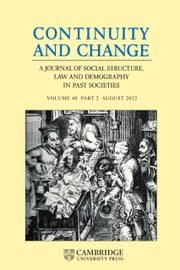Crossref Citations
This article has been cited by the following publications. This list is generated based on data provided by
Crossref.
VANHAUTE, ERIC
and
LAMBRECHT, THIJS
2011.
Famine, exchange networks and the village community. A comparative analysis of the subsistence crises of the 1740s and the 1840s in Flanders.
Continuity and Change,
Vol. 26,
Issue. 2,
p.
155.
De Langhe, Sofie
2012.
To thrive, one must wive? Subsistence strategies of single women in eighteenth- and early nineteenth-century rural Flanders.
The History of the Family,
Vol. 17,
Issue. 2,
p.
199.
RONSIJN, WOUTER
2013.
Mediated and unmediated market dependence in the Flemish countryside in the nineteenth century: two paths of rural development.
Continuity and Change,
Vol. 28,
Issue. 1,
p.
89.
Lambrecht, T.
2013.
English individualism and continental altruism? Servants, remittances, and family welfare in eighteenth-century rural Europe.
European Review of Economic History,
Vol. 17,
Issue. 2,
p.
190.
Gezelius, Stig S.
2014.
Exchange and Social Structure in Norwegian Agricultural Communities: How Farmers Acquire Labour and Capital.
Sociologia Ruralis,
Vol. 54,
Issue. 2,
p.
206.
Devos, Isabelle
De Langhe, Sofie
and
Matthys, Christa
2014.
Lost in registration? Missing occupations of single women in the Bruges countryside, c.1814.
The History of the Family,
Vol. 19,
Issue. 4,
p.
469.
RONSIJN, WOUTER
2014.
Smallholders, Spinners, Weavers and the ‘scarcity of markets’ in the Flemish Countryside, c. 1780–1850: Motivations behind the Multiplication of Periodic Markets.
Rural History,
Vol. 25,
Issue. 1,
p.
39.
Gelderblom, Oscar
and
Jonker, Joost
2015.
Enter the Ghost - Cashless Payments in the Early Modern Low Countries, 1500-1800.
SSRN Electronic Journal,
van Cruyningen, Piet
2015.
Commerce and the countryside. The rural population's involvement in the commodity market in Flanders, 1750–1910.
The Journal of Peasant Studies,
Vol. 42,
Issue. 5,
p.
1058.
De Graef, Pieter
2017.
Food from country to city, waste from city to country: an environmental symbiosis? Fertiliser improvement in eighteenth-century Flanders.
Journal for the History of Environment and Society,
Vol. 2,
Issue. ,
p.
25.
Lindström, Jonas
and
Mispelaere, Jan
2017.
Interdependent living: labouring families and the Swedish mining industry in the late seventeenth century.
The History of the Family,
Vol. 22,
Issue. 1,
p.
136.
Van den Broeck, Nick
Lambrecht, Thijs
and
Winter, Anne
2018.
Pre-industrial welfare between regional economies and local regimes: rural poor relief in Flanders around 1800.
Continuity and Change,
Vol. 33,
Issue. 2,
p.
255.
DE VIJLDER, NICOLAS
2018.
The Rural Land Market in Early Modern Inland Flanders and Brabant: A Long Run Perspective.
Rural History,
Vol. 29,
Issue. 2,
p.
115.
Van Onacker, Eline
2018.
Land and Credit.
p.
253.
Van Onacker, Eline
2019.
Social vulnerability, social structures and household grain shortages in sixteenth-century inland Flanders.
Continuity and Change,
Vol. 34,
Issue. 01,
p.
91.
Lindström, Jonas
2019.
Labouring Poor in Early Modern Sweden?.
Scandinavian Journal of History,
Vol. 44,
Issue. 4,
p.
403.
Roosen, Joris
2022.
The Black Death: window of opportunity or disaster? Demographic growth, stagnation and decline in the County of Hainaut (1349-1541).
De Medio Aevo,
Vol. 11,
Issue. 2,
p.
157.
Soens, Tim
and
Bruyet, Cécile
2024.
Mezzi di scambio non monetari. Merci e servizi come monete alternative nelle economie dei secoli XIII-XVIII / Alternative currencies. Commodities and services as exchange currencies in the monetarized economies of the 13th to 18th centuries.
Vol. 4,
Issue. ,
p.
475.
Bernardi, Philippe
2024.
Mezzi di scambio non monetari. Merci e servizi come monete alternative nelle economie dei secoli XIII-XVIII / Alternative currencies. Commodities and services as exchange currencies in the monetarized economies of the 13th to 18th centuries.
Vol. 4,
Issue. ,
p.
5.
Aerts, Erik
2024.
Mezzi di scambio non monetari. Merci e servizi come monete alternative nelle economie dei secoli XIII-XVIII / Alternative currencies. Commodities and services as exchange currencies in the monetarized economies of the 13th to 18th centuries.
Vol. 4,
Issue. ,
p.
1.




